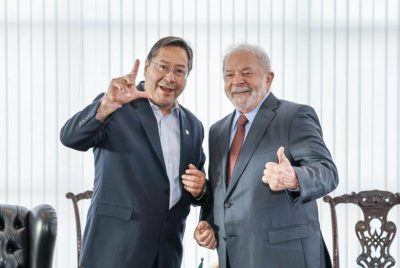Lula Confirms Brazil’s Return to CELAC with Arce

All Global Research articles can be read in 51 languages by activating the Translate Website button below the author’s name.
To receive Global Research’s Daily Newsletter (selected articles), click here.
Follow us on Instagram and Twitter and subscribe to our Telegram Channel. Feel free to repost and share widely Global Research articles.
***
Brazilian President Luiz Inácio Lula da Silva announced to his Bolivian counterpart, Luis Arce Catacora, that his country will once again join the Community of Latin American and Caribbean States (CELAC), from which it withdrew in 2020 by decision of former president Jair Bolsonaro.
The decision will be ratified by Lula during the VII Summit of Heads of State to be held in Buenos Aires, Argentina, on 24 January, said the deputy foreign minister, Freddy Mamani.
“This participation of the president of Brazil, Brazil’s return to Celac is very important, this announcement is fundamental for Latin America and the Caribbean and will strengthen the process of regional integration,” Mamani said during a press conference.
On 16 January 2020, the Bolsonaro government announced that it had decided to withdraw Brazil from Celac because it considered that it “gave prominence to non-democratic regimes”.
On the same grounds, earlier, in April 2019, the far-right leader made Brazil’s withdrawal from the Union of South American Nations (Unasur) official. Instead, he integrated Brazil into the Forum for the Progress of South America (Prosur), founded in March 2019 in Chile by right-wing governments and which excludes Venezuela by decision of the conservative governments of the eight member countries.
Unlike Bolsonaro, Lula, who assumed the presidency on 1 January, has a different conception of both blocs and even has a broad predisposition to give them a major regional boost.
In fact, the Bolivian deputy foreign minister said that Arce and Lula talked about “recovering Unasur, on new bases, guaranteeing a clear programmatic and effective sense of the organisation”.
Mamani affirmed that the sub-regional organisation will be “reconstructed” for greater continental integration in line with the deepening of bilateral relations between Brazil and Bolivia, as agreed by Lula and Arce.
At the meeting held by the two heads of state on 2 January, it was decided to “rebuild and deepen the broad agenda of work between Bolivia and Brazil for the benefit of our peoples, including cooperation, investment, trade and environmental issues, among others,” Mamani stressed.
They also analysed actions to strengthen border security and the fight against drug trafficking.
They also discussed various trade agreements, including the purchase and sale of natural gas, the possible export of electricity and the sale of urea and potassium chloride.
Although the leaders addressed the topics in general terms, the vice-chancellor said that each of them would be analysed by work teams from both governments.
*
Note to readers: Please click the share buttons above. Follow us on Instagram and Twitter and subscribe to our Telegram Channel. Feel free to repost and share widely Global Research articles.
Featured image: The presidents of Bolivia, Luis Arce Catacora, and Brazil, Luiz Inácio Lula da Silva. (Image by abi.bo)

